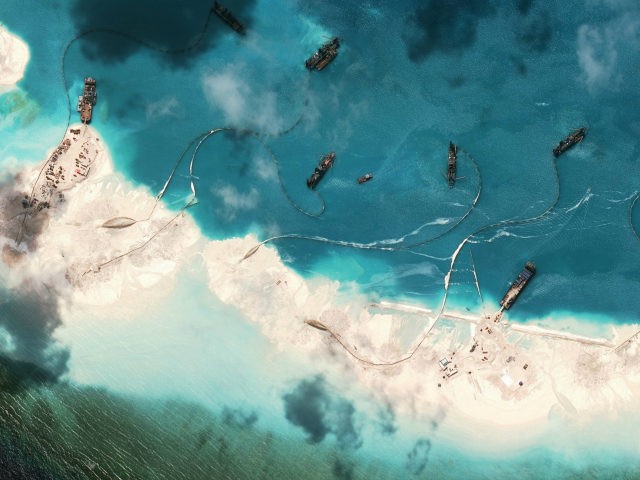Capitalizing on the highly-publicized spat between Philippine President Rodrigo Duterte and his U.S. counterpart Barack Obama, China has exploited the Association of Southeast Asian Nations (ASEAN) this week to impose its own rules on South China Sea navigation with seemingly little resistance.
China claims most of the South China Sea, including territories legally part of the Philippines, Vietnam, Brunei, Malaysia, Taiwan, and Indonesia — all but one members of ASEAN. The Philippines decisively won a case against China’s regional claims at the Hague in July, one that China has been effective in persuading Duterte to set aside in multilateral talks regarding China’s presence in Philippine waters. For his efforts, Duterte is now facing an ever-growing flotilla of Chinese ships surrounding Manila’s Scarborough Shoal.
China’s state-run media outlets have all declared this week’s ASEAN conference a success, especially regarding the South China Sea dispute. A statement in Xinhua declared the conference was proof that China’s relationship with the Southeast Asian states was “entering a period of maturity.” The two sides, the publication claims, “reaffirmed their respect of freedom of navigation and overflight in the South China Sea under principles of international law.”
The declarations from Beijing-controlled media create the appearance of mutual belligerence regarding regional claims coming into the conference. While the Philippines chose to bring the territorial case to the Hague, it has been Beijing’s leaders who have repeatedly resorted to belligerence language against other claimants, including threatening to give them a “bloody nose” and calling the leaders of Japan and the United States “eunuchs” for their support of the international tribunal verdict.
The nations signed an agreement to “use the safety and communication procedures for the safety of all our naval ships and naval aircraft, as set out in CUES, when they encounter each other in the South China Sea,” though the governments did not make clear what these procedures are. Given China’s praise of them, it appears that they will involve notifying the Chinese military of any activity in the region, even in areas that do not form part of the Chinese state.
The nations are also working on a “code of conduct” in the region not yet completed.
Vague as the provisions may be, Xinhua notes that these declarations “send out strong signals that any attempt to interfere in the South China Sea issue and sow discord between China and ASEAN from those countries outside the region is doomed to failure,” a statement clearly directed at the United States. In the past, China has threatened to go to war against the United States over the presence of U.S. Navy ships in international waters through its state-run newspapers, even deeming it “inevitable” in the case of one editorial.
If China can have its neighbors expel the United States from the region for it, however, Beijing has made clear it will also accept this outcome by cheering Duterte for calling Obama a “son of a whore,” a remark that led to President Obama canceling his one-on-one meeting with the Philippine president.
An editorial in the Global Times argues that Duterte’s insult is a sign that the Philippines does not fear China as much as America allegedly hopes it does: “But why did Duterte slap Obama in the face? The reason is that the Philippines does not feel insecure even faced with China’s ‘threat.'” The times also claim Duterte was speaking “on behalf of developing countries” against the West, asserting, “he had had enough.”
What this means for China, the column concludes, is that an opportunity exists to exploit this tension and rid the region of its U.S. presence once and for all: “Beijing and Manila do have territorial disputes. But despite US support and a favorable arbitration award to the Philippines, the Philippines gained no real benefits.” The authors do provide one caveat, however: Duterte is unpredictable, and “from a long-term perspective, it will not necessarily be easy to deal with the Philippines under his rule.”
China’s transparent glee at the Duterte incident has not prevented its military from engulfing more Philippine territory; if anything, the timing of the sudden presence of new Chinese ships near the disputed Scarborough Shoal indicates Beijing has seen an opportunity in the conflict. Manila released images Wednesday of what it claims are Chinese coast guard ships and barges in the area, which may indicate that Beijing is looking to create another artificial island in the region. China’s artificial islands in the Spratly and Paracel Islands, usurping Philippine and Vietnamese territory, are now highly-developed military facilities, though China insists they will only be used for civilian purposes.
“We have reason to believe that their presence is a precursor to building activities on the shoal,” Philippine defense department spokesman Arsenio Andolong said of the coast guard ships in the region. “We are continuing our surveillance and monitoring of their presence and activities, which are disturbing.” While the U.S. is still bound to protect Philippine territory, the souring of relations between Obama and Duterte may make requesting aid against China more difficult should Beijing continue to grow its presence near the shoal.

COMMENTS
Please let us know if you're having issues with commenting.